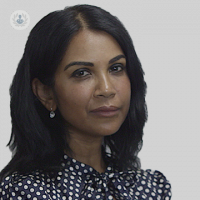Understanding refractive lens exchange
Written by:Refractive lens exchange is an extremely common surgery performed worldwide each year, but what is it and who is it most suitable for? Esteemed consultant ophthalmologist, Ms Tahmina Pearsall, is here to answer any questions or doubts that you may have surrounding refractive lens exchange.

What is refractive lens exchange surgery?
Refractive lens exchange (RLE), also referred to as lens replacement surgery, is a widely performed procedure that involves the replacement of the eye's natural lens with an artificial implant known as an intraocular lens.
The purpose of RLE is to correct common vision problems, such as nearsightedness, farsightedness and astigmatism, reducing the dependence on glasses or contact lenses. Additionally, this surgery can effectively improve vision for individuals with cataracts.
Who is corrective lens surgery most suitable for?
RLE is most suitable for individuals aged 50 and above, although exceptions can be made for younger patients, especially if they are unsuitable candidates for laser eye surgery. In such cases, eye lens replacement surgery offers a viable option.
In summary, RLE is suitable for patients experiencing the following conditions:
- Reliance on bifocal, varifocal, or multifocal contact lenses or glasses
- Presbyopia
- Farsightedness (hyperopia)
- Nearsightedness (myopia)
- Astigmatism
- Cataracts
- Glaucoma
How does refractive lens surgery work?
As individuals age, the clarity and flexibility of their natural lenses decline, and some may develop early stages of cataracts. In such cases, replacing the natural lens becomes the optimal choice for vision correction even for those with lower prescriptions, particularly in cases of farsightedness.
Is refractive lens exchange the same as cataract surgery?
Refractive lens surgery and cataract surgery are essentially identical procedures. When cataract surgery aims primarily to correct the need for glasses, it is termed RLE or lens replacement surgery.
Are lens implants permanent?
Yes, lens implants are permanent and have significantly improved the quality of life for countless individuals by restoring or enhancing their vision. Though eye lens replacement does carry some risks, complications are rare and affect only a small proportion of patients.
What happens during surgery?
During the initial consultation, a specialist consultant eye surgeon will assess and test the patient's eyes to determine their suitability for lens replacement surgery. The surgeon will also discuss the procedure's benefits and potential risks, and create a personalised plan based on the patient's needs.
What is the typical cost of lens replacement surgery?
Cost may vary but in my practice, the initial consultation fee is £180. The total cost of the subsequent treatment will be confirmed after agreeing on the personalised plan with the consultant. The overall cost of onward treatment starts at £2,500 per eye, covering take-home medication and one post-operative appointment. The final price may vary depending on the specific lens requirements.
Recovery Times and Aftercare for RLE/Lens Replacement Surgery
Recovery times for this type of surgery vary, typically taking between three to four days. During this period, patients may experience blurred vision, glare, sensitivity, and mild discomfort in the eye.
Safety of lens replacement surgery
RLE/Lens replacement surgery is one of the safest and most commonly performed procedures worldwide. Over three million surgeries are conducted in Europe alone each year. While, like any surgery, there are inherent risks, complications are rare, and most issues can be successfully managed through medication or follow-up procedures.
If you are considering refractive lens exchange and would like to book a consultation with Ms Pearsall, simply visit her Top Doctors profile today.


